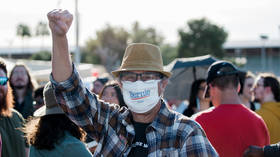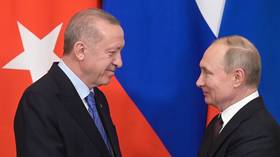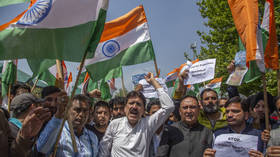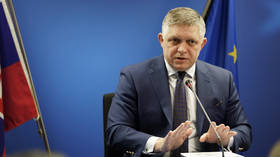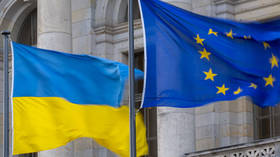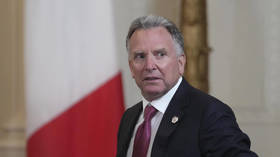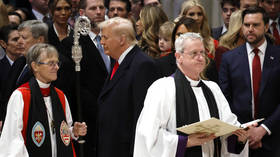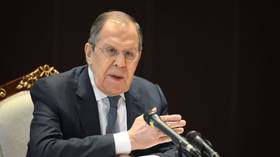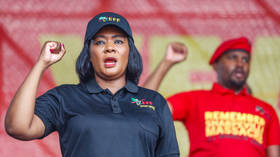Rigged US primaries aren’t the problem – the rigged election system is
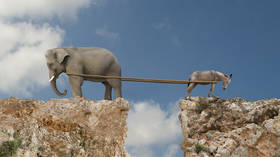
Activists are calling for international observers for US primaries, claiming they’re rigged. The thing is, observers aren’t mandated to watch internal party processes – but the real problem lies in multi-party competition, anyway.
With hashtags such as #RiggedDNC and #RiggedPrimary trending, there has been a flurry of calls for outside monitors on social media and by activists, who cite a series of voter-suppression acts and possibly rigged voting machines.
#RiggedDNC is exactly the reason why @BernieSanders and some of his supporters are no better than trump.Support your preferred candidate, but if/when they come up short, don’t mimic trump claims of rigged elections.Reminder - you’re democrats, not republicans.
— Maggie Jordan (@MaggieJordanACN) March 4, 2020
CODEPINK and the Grayzone Project staged a demonstration Tuesday outside of the Organization of American States (OAS) headquarters, calling on the intergovernmental body to dispatch “emergency international election observers” to the US Democratic presidential primary, noting that the contest has “been the scene of severe discrimination against minority, poor and elderly voters.”
But the dirty secret is that international observers, even if allowed at the primaries, would have no standing to prevent parties from rigging their internal elections as much as they want. The real problem in the United States is not rigged primaries, it’s a rigged electoral system that prevents multi-party competition.
Also on rt.com Voters face delays, untested new procedures in Michigan, Missouri, Washington, Mississippi, Idaho, and North DakotaWorking as intended
Deploying for a primary process falls outside of observers’ mandates to begin with. While the United States is obligated under international agreements to issue invitations to observe its elections, it is under no obligation to invite observers to monitor how political parties select their leaders.
The criteria that observers use to assess elections include international agreements such as the International Covenant on Civil and Political Rights and the OAS 2001 Inter-American Democratic Charter, which include no provisions for how political parties conduct their internal business.
The OAS Charter provides for the “holding of periodic, free, and fair elections based on secret balloting and universal suffrage” and a “pluralistic system of political parties and organizations.” Article 5 of the Charter identifies “the strengthening of political parties and other political organizations [as] a priority for democracy.” While it notes that attention should be paid to campaign financing, it does not address issues of party procedures for selecting leaders.
Criteria used by another international body, which has regularly observed elections in the United States since 2004, also provides no basis for observing political parties. The Organization for Security and Cooperation in Europe (OSCE), which counts the United States as one of its 57 members, uses criteria outlined in the Copenhagen Document, which set out principles for free elections in 1990.
The Copenhagen Document requires that individuals are guaranteed the right “to establish, in full freedom, their own political parties.” Governments must “provide such political parties and organizations with the necessary legal guarantees to enable them to compete with each other on a basis of equal treatment before the law and by the authorities.”
‘As intended’ doesn’t mean ‘fair’
As the OSCE Office for Democratic Institutions and Human Rights elaborates in its election observation handbook, a free election must respect basic fundamental freedoms such as “the right to freely establish political parties and compete for public office on a level playing field.”
America is one of the most corrupt countries on Earth.The "elections" are all rigged.The politicians are all bought & paid for.And the media is owned & controlled by Oligarchs who want the current endemically corrupt system to remain in place.#RiggedPrimarypic.twitter.com/wD61vcqMR7
— Ian56 (@Ian56789) March 4, 2020
This is actually where the United States falls short of its international obligations. There is little respect for the rights of independents and third parties and no real opportunity for them to compete within the US’ rigidly enforced two-party system. Indeed, as the OSCE noted in its assessment of the 2016 election, the undue obstacles faced by minor parties and independents trying to attain ballot access across the country could constitute a breach of democratic commitments.
“The number of signatures required and the signature submission deadlines vary from state to state, which made it cumbersome for third party or independent candidates to register across all states for presidential elections,” the OSCE pointed out. “Both the Green Party and Libertarian Party challenged ballot access requirements in several states, with success in a few instances.”
The OAS noted the obstacles third parties face in gaining access to the media and specifically the practice of excluding them from televised debates. “Due to the high threshold required for candidates to participate in these debates, in 2016 only the Democratic and Republican candidates qualified for them, which resulted in complaints from the independent and third party candidates,” the OAS observed. OAS monitors said that this “may serve to reinforce the two-party system.”
I don’t know one way or another if it’s #RiggedPrimary. It is a sad commentary that a great many Democrats believe Joe Biden is the absolute best America can do. #SMHpic.twitter.com/F4LTfXM7wP
— 🌹 Clark aka “The Other Biden” (@Clarknt67) March 4, 2020
This is the real issue when it comes to democratic shortcomings in the United States. While primaries might feel like an integral part of the electoral process to the typical American voter, they are not elections and are not covered under international election-related obligations.
What is covered quite clearly is the requirement to provide a level playing field for all political parties that seek to compete. So, rather than focusing on ensuring fair primary elections in the United States, democracy activists might be better off highlighting the shortcomings of the two-party system itself.
The statements, views and opinions expressed in this column are solely those of the author and do not necessarily represent those of RT.
